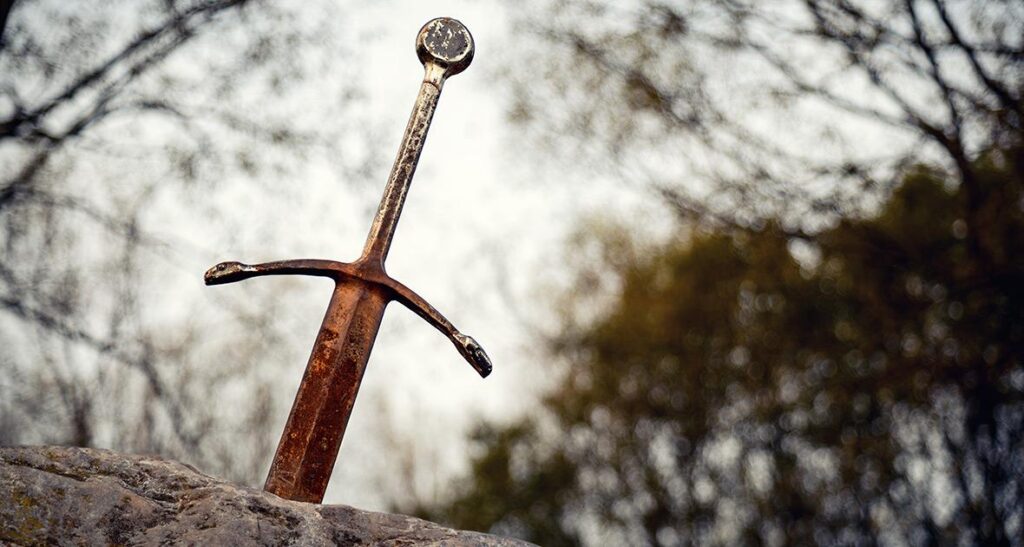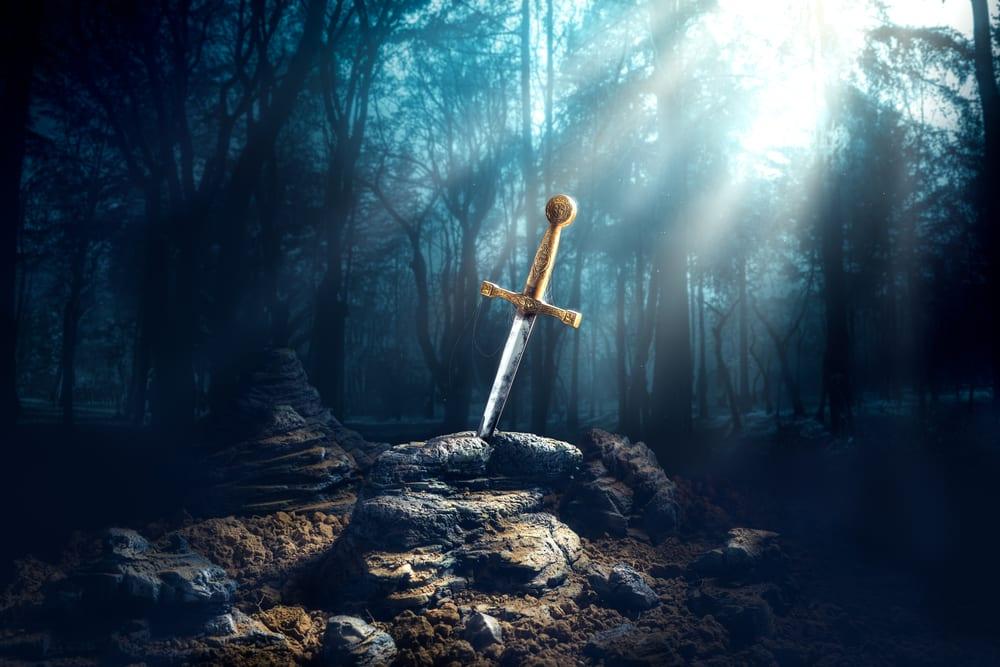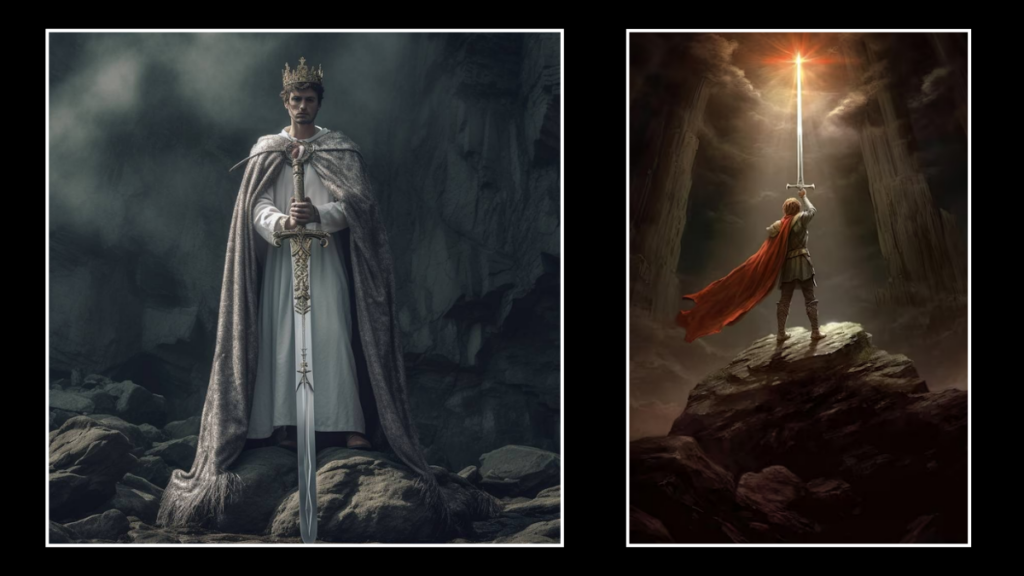The Mythological Origins of Excalibur: Uncovering the Ancient Roots of the Legendary Sword

Excalibur, the legendary sword of King Arthur, stands as one of the most iconic symbols of power and kingship in Western mythology. While most recognize Excalibur as the sword pulled from the stone or given to Arthur by the Lady of the Lake, its origins reach deeper into ancient Celtic myth and pre-Christian symbolism. The sword’s creation and its role in Arthurian legend are intertwined with older myths that speak to the reverence of weapons as divine tools, as well as their connection to sovereignty and the supernatural.
Excalibur and Its Arthurian Roots
The first time many encounter Excalibur is through the legend of King Arthur, the mythical ruler of Britain. In Sir Thomas Malory’s Le Morte d’Arthur (1485), one of the most influential retellings of Arthurian legend, Excalibur is described as a sword of unparalleled power, symbolizing Arthur’s divine right to rule. However, Arthurian legend presents two differing origins for the sword: in one, Arthur pulls it from a stone, proving his rightful kingship, and in another, it is given to him by the mystical Lady of the Lake.
While these stories are foundational to Arthurian lore, they draw on far older mythological traditions, where swords, kingship, and divine power were closely linked. The name ‘Excalibur’ itself is thought to have evolved from the Welsh phrase Caledfwlch, meaning “hard cleft” or “hard lightning.” This name echoes the idea of the sword as a force of immense, almost elemental power.

Celtic Origins: Caledfwlch and the Mythical Weapons of the Gods
Before it became Excalibur, Caledfwlch existed in early Welsh myth as one of the treasures of Britain. In the medieval Welsh prose tales known as the Mabinogion, the sword is a possession of the hero Pryderi. It shares similarities with other mythological swords, notably the Irish Caladbolg, a sword wielded by the hero Fergus mac Róich in Irish mythology. Both Caledfwlch and Caladbolg translate roughly to “hard cleft” or “strong break,” signifying a weapon of great destructive power.
The resemblance between these two swords suggests a shared Celtic origin that predates the Arthurian legends. Celtic mythology is full of supernatural weapons associated with gods and heroes, where swords were not only tools of warfare but vessels of divine power. In many Celtic traditions, kingship and sovereignty were closely linked to sacred weapons, and the sword itself was a symbol of a ruler’s divine right to govern.
Excalibur and the Sacred Kingship
Excalibur’s connection to kingship is not just a theme in Arthurian legend but a reflection of an ancient cultural belief. Among the Celts, the king was seen as a sacred figure, chosen by the gods to protect the land. The sword was the ultimate symbol of that authority, often imbued with magical qualities to signify the ruler’s divine mandate. This idea of a ruler being granted a magical weapon by a supernatural figure, such as the Lady of the Lake, mirrors older myths where kings were chosen by deities or spirits associated with the land.
The act of pulling the sword from the stone also reflects ancient initiation rites or trials that a king must undergo to prove his worthiness. In early myths, this often involved the king receiving a sacred object, weapon, or blessing from the gods, signifying his role as a bridge between the divine and the mortal world.

Excalibur’s Magical Attributes: A Weapon Beyond Mortality
In many Arthurian tales, Excalibur is not just a symbol of kingship but also a weapon of immense magical power. It is said to make Arthur invincible in battle, and its scabbard can prevent its wielder from bleeding. These magical traits are consistent with the portrayal of legendary swords in various mythologies.
In ancient cultures, weapons were often thought to be imbued with supernatural powers, sometimes gifted by the gods themselves. In Irish mythology, the sword Fragarach (the “Answerer”) was a divine weapon that could cut through any armor and compel truth from its victims. Similarly, the Norse sword Gram, wielded by the hero Sigurd, was said to have been forged by a god and carried immense power. Excalibur’s association with magic draws on this long tradition of supernatural weapons that represent both physical might and divine favour.
The Lady of the Lake: A Connection to Ancient Water Deities
One of the most famous aspects of the Excalibur myth is its association with the Lady of the Lake, a mysterious, ethereal figure who resides in the water and bestows the sword upon Arthur. Water deities and the symbolism of lakes and rivers are deeply embedded in Celtic mythology. The Celts believed that bodies of water were portals to the Otherworld, a mystical realm where gods and spirits resided. Rivers, lakes, and wells were often seen as sacred, with offerings—sometimes weapons—cast into them as a form of worship or supplication to the gods.

The image of the Lady of the Lake reflects these ancient beliefs. As a water spirit or deity, she represents the Otherworld’s connection to the material realm, and by giving Arthur Excalibur, she is conferring upon him a divine mandate to rule. The motif of a sacred sword emerging from the water may be rooted in the practice of casting swords and other valuable objects into lakes as votive offerings, a tradition found in archaeological evidence throughout the Celtic world.

The Legacy of Excalibur in Arthurian Legend
As the Arthurian legend evolved, so too did the myth of Excalibur. What began as a Celtic symbol of divine kingship became a central part of medieval chivalric ideals. Excalibur, with its blend of magic, power, and sovereignty, embodies the merging of pagan traditions with the Christianized values of the medieval period.
Despite the layers of interpretation and adaptation over the centuries, Excalibur’s mythological roots remain clear. The sword’s origins in Celtic myth and its role as a symbol of kingship and divine power continue to resonate in its later incarnations, from literature to film. Excalibur’s enduring appeal lies in its embodiment of timeless themes: the quest for legitimacy, the responsibility of leadership, and the connection between the mortal and the divine.
In this way, Excalibur is more than just a sword; it is a bridge between worlds, a tool that empowers its wielder and connects them to something greater than themselves—a fitting symbol for the once and future king.
–Silviya.Y








